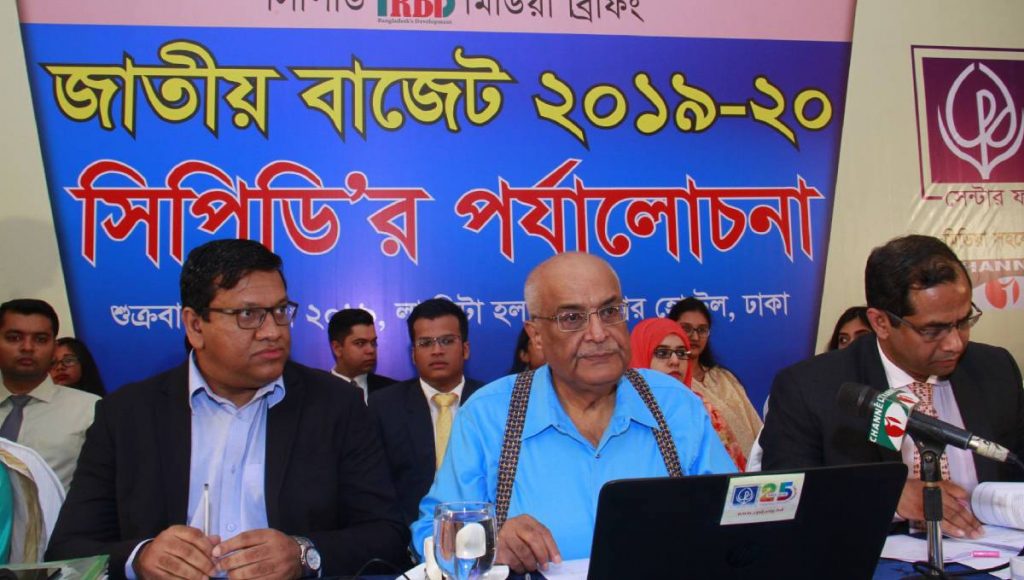Dhaka, June 14 – The proposed national budget has not reflected the pledges of the ruling party Awami League’s election manifesto as it would go in favour of the people who are beneficiary of economic misrule instead of the larger segment of the poor people, said Centre for Policy and Dialogue (CPD) yesterday.
In the budget analysis CPD distinguished fellow Dr Bebapriya Bhattacharya said, “Without ensuring the demands of the poorer segment of the population in education, health and social expenditure, it would not be possible to reach to a middle-income country.”
Expressing concern over the widening gap of disparity, he said, “If the disparity widens in a society, the society will not sustain. It’s a historical truth. Bangladesh has been created fighting against discrimination. Everyone wants a high middle-income country. But if discrimination increases, it will not be achieved.”
“The proposed budget has given more facilities to the high-income people. The poor people will only get a marginalised benefit. Most important is how the poor people are getting education, health facilities and public transports. Poor people cannot go to Bangkok, Singapore for treatment,” he said,
“The turning of the country into a middle-income one is depending on what we can do for the middle-class people. It is interconnected. The middle class is the main driving force,” he added.
He came up with the observation at a programme on ‘National Budget for FY2019-20 an Analytical Perspective’ at a city hotel.
He has also raised questions regarding the transparency of the budget saying that “there is a gap between the information given by the National Board of Revenue (NBR) and finance ministry.”
“If you focus the data of NBR, the rate will be higher but if you focus the date of the finance ministry, the rate will be lower,” he added.
He said, “Emerging challenges in economic management have largely remained unaddressed in the budget. Despite being the budget for the terminal year of seven five year plan, there was no visible urge to make the last stride towards the fulfillment of the planned targets. There is no innovation in inflation, trade policy or subsidy distribution. Finance minister’s budget presentation has innovation but it lacks innovation in budget preparation.”
“The budget should have been prepared in line with the election manifesto considering all the sectors but it, to us, has not been reflected. There has been a number of promises made such as generating employment, raising the number of one crore taxpayers but it does not have any concreted timebound plan or programme,” he added.
“The budget might have some airy promises but we don’t find any concrete things to its fulfillment,” he said.
“We are always telling about structural reforms agenda in the annual development plan, revenue programme and services. But we have been deprived again in the budget,” he said.
The entire development programme is standing on infrastructural development with the money of the government and to reach through it. But it is a prehistoric idea. It does not have any connection with inclusive development,” he observed.
“The growth rate is increasing but the poor people are not being benefiting, resulting in pressure on social capacity. The discrimination is widening in income, richness and consumption. The discrimination is being more evident in the rural economy,” he said.
He further said the size of the budget has been increased in terms of money but the GDP has not been increased. ‘If GDP is not increased by 16 percent, our desire for a middle-income country will not be fulfilled,” he added.
Regarding the problems in banking and share market, he said, Those who have taken unjust advantages, they don’t want any reforms here. They don’t want transparency. They don’t want banking commission in fear of that their secrets will be revealed.”
He said only the increase of the tax net is not sufficient rather the money laundering has to be checked.
In the budget analysis, Dr Bebapriya Bhattacharya said, “The education budget has decreased as a share of total budget but election manifesto said for highest allocation for education. The implementation of the overall education budget in FY18 (85.8pc) is lowest in the last decade but manifesto said proper
He said education budget got the second largest allocation of 15.2
He also said the revenue collection by the large tax unit has decreased (11.2 pc) due to marginal improvement expected in
He also said the allocation for agriculture is decreasing. This time agriculture received 20.8 pc of the total allocation (Tk 9,000 crore) – a similar allocation since FY 14. Even over the last three years, it has never been possible to fully spend the agriculture subsidy (Tk 2,570 crore, Tk 5,390 crore and Tk 3,800 crore remained
CPD has differed with the
He could not agree with the bank borrowing to cover up the budget deficit.
About annual development plan (ADP), he said, “Revenue surplus as a share of financing ADP is increasing in terms of allocation but declining in terms of actual expenditure.
He has appreciated the government for not taking any new projects which is a good sign. “Share of allocation for concluding projects has been increasing marginally while declining for carryover projects. The share increased to 28.7 pc in FY 20 from 22.7 pc in FY17,” he added.
The rich people will get benefits out of wealth surcharge as minimum net exemption limit has been increased to Tk3 crore from 2.25 – leaves a number of rich people out of the surcharge net. It implies that a taxpayer even after owning four 2000 square feet flats in Gulshan area, is still exempted from playing the surcharge.
CPD has lambasted the existing provision about untaxed or illegal money to be continued which will encourage immoral/illegal activities and discourage regular taxpayers. CPD demands
CPD has welcomed initiatives like VAT exemption threshold, VAT exemption on showroom run by women entrepreneurs, handmade confectionary, non-mechanical carriage for disabled persons, medical




